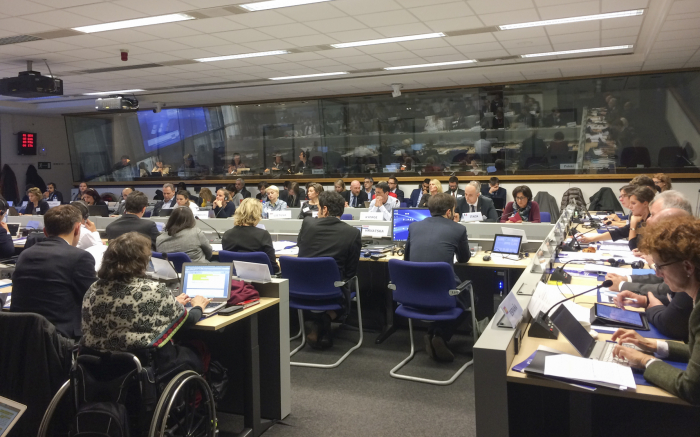They focus on the “unelected bureaucrats” running the EU institutions. Yet there’s an elite they don’t notice – and of which they are members. The EU’s institutions and its parliamentary seats are all but closed to people who aren’t white.
This is more evident than ever in the run-up to the current elections. Countless political debates are taking place in the future of the EU, but without a person of colour in sight. Apparently, the future of Europe is white. White people debate with other white people on issues as wide as climate disaster, economic policy, migration and security. Buzzwords such as populism and nationalism are thrown around, and yet the undeniable whiteness of the EU institutions goes unremarked.
While campaigners occasionally lament the lack of women in high positions in the EU’s bodies, very little has been said about the abysmal representation of people of colour, despite estimates that at least 50 million people in Europe come from ethnic minorities. There has never been a black or brown European commissioner, nor has a black or brown person holding any of the top positions of the parliament or council. In the current parliament, the representation of people of colour is less than 3%, and Italy’s Cécile Kyenge is the sole black woman.
After May, Europe’s race problem looks like it will get worse. The threat of the far right is well documented, with renewed efforts to unite rightwing anti-immigration parties across the continent. Yet the European aversion to talking about race equality has meant the issue of representation has gone unnoticed.
My organisation, the European Network Against Racism, analysed candidate lists for the elections to find out how racially diverse the EU institutions will be after May. We found the lack of representation extraordinary. Fewer than 3% of all European parliament candidates are people of colour, and an even lower proportion is likely to be elected. As it stands, racial diversity in the European Parliament will remain stagnant.
It is clear that the EU institutions have failed to make racial diversity a priority. This is apparent within the internal staff of the European institutions as much as elected officials. A hashtag has even been launched, #BrusselsSoWhite.
National parties play a huge role. Even when parties do include minority candidates on their lists, they are rarely at the top, or in the safe seats. Left-leaning parties are overwhelmingly more inclusive than their rightwing counterparts, putting forward around 60% of all the candidates of colour. The Labour party in Britain, La France Insoumise and Sweden’s Social Democrats came out top for racial representation – so if the UK does exit the EU, this will be an undeniable blow for diversity.
Yet the left is not projected to grow in the next parliament, and the most diverse group, the Progressive Alliance of Socialists and Democrats, is projected to lose around 40 seats. We only found 16 minority candidates on the lists of the centre-right European People’s party group, across all 28 member states. Even fewer will be elected.
There are some positive stories: things are looking good for La France Insoumise candidate Leïla Chaibi, and a number of candidates from across Sweden’s political spectrum, including Jessica Polfjärd, Evin Incir and the list leader for the Swedish Greens, Alice Bah Kuhnke. These candidates are bringing great hopes for a feminist, anti-racist European politics.
We know that just having people of colour in the office cannot guarantee racial progress. Representation is only one step along the way and must be followed by a true commitment to fairer policies on equality and migration. Yet if the EU institutions and parties fail to represent citizens of colour, they’ll prove to be not so different from the racists and nationalists who are simply more explicit in their belief that Europe is white.
The EU’s lack of racially diversity is in itself a crisis of legitimacy. The EU needs to reimagine itself. Migrants, minorities and people of colour are an undeniable fact of Europe’s reality. It’s time Europe reflected that.
Sarah Chander is an advocacy officer at the European Network Against Racism.
Read the original article on The Guardian.
















































